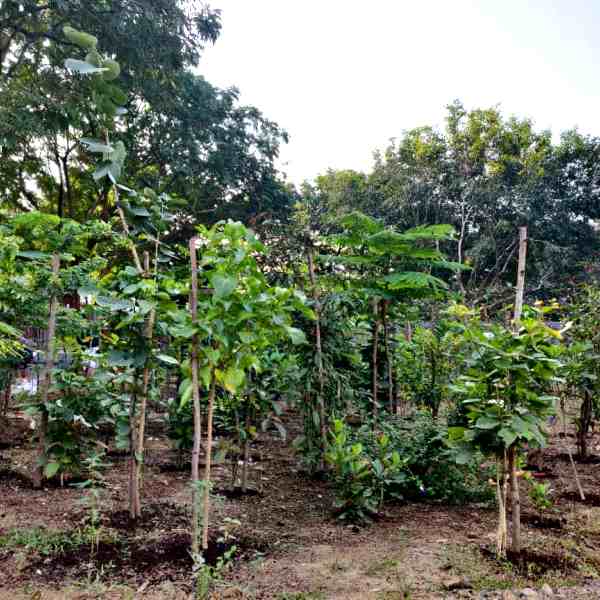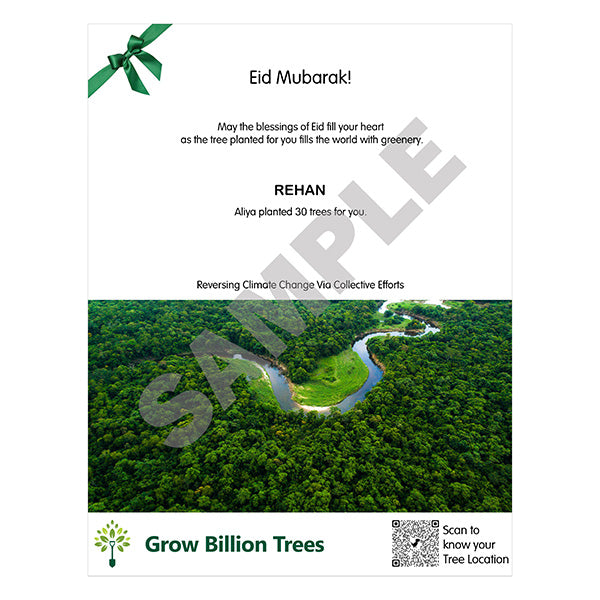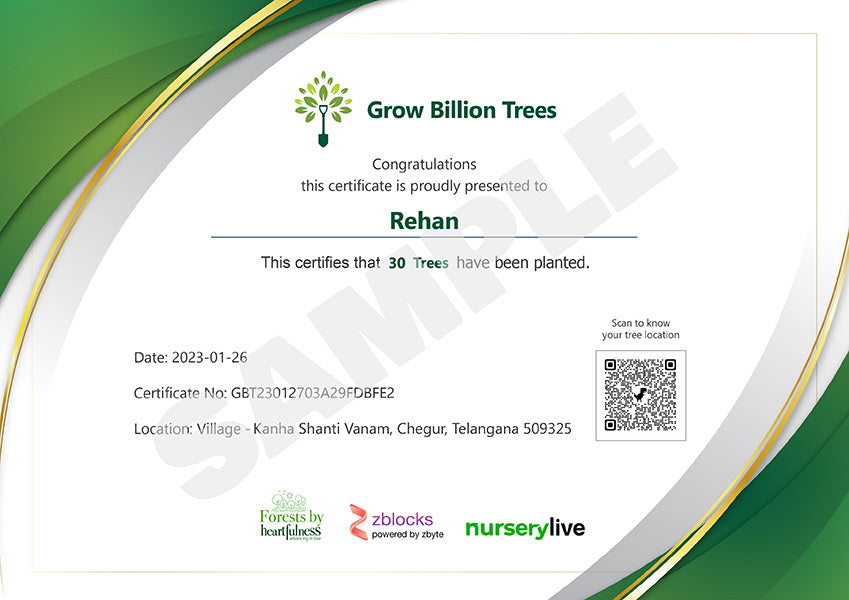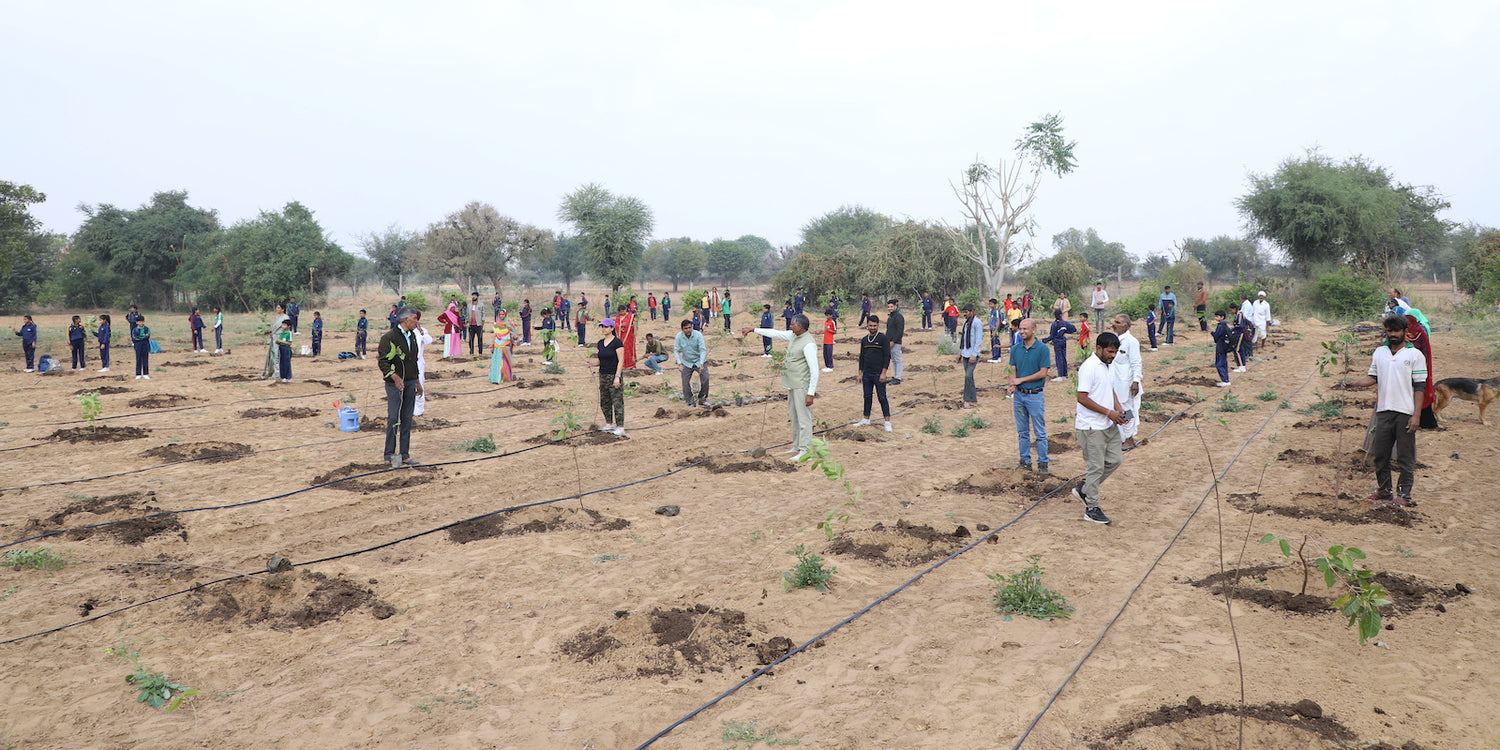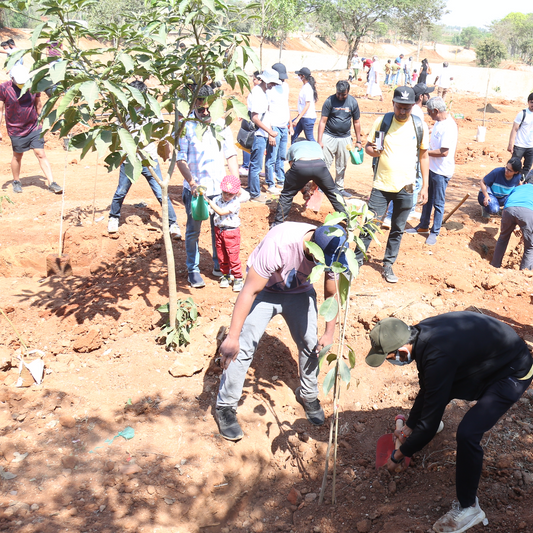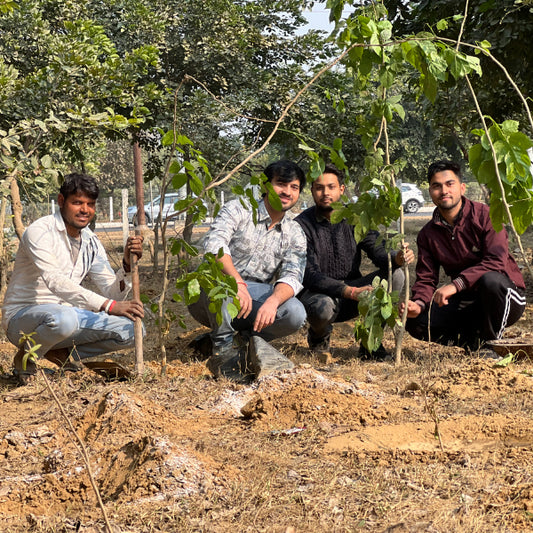Trees for Eid
Trees for Eid
Hint: 30 Trees for fasting
99 Trees for names attributes to Allah (God)
Couldn't load pickup availability
What you get ?
Tree(s) Plantation
Tree(s) Plantation
A tree(s) native to the region will be planted within 7 -10 days, and post-plantation monitoring will be thoroughly managed.
*You will receive an email/whatsapp notification immediately after the tree(s) plantation. or you can check the current status by logging into "My Account" anytime.
e-Greeting Card of Tree(s) Plantation for Gifting
e-Greeting Card of Tree(s) Plantation for Gifting
If you want to gift these tree(s) to your loved ones, You can generate an e-Greeting card for tree(s) plantation by logging into "My Account" after placing order.
*Please generate it within 5 days of placing the order.
e-Certificate of Tree(s) Plantation
e-Certificate of Tree(s) Plantation
A e-certificate of Tree(s) Plantation with the project details will be issued in your name after tree(s) plantation.
*You can download it from "My Account".
Geotag of your Tree(s)
Geotag of your Tree(s)
You can immediately track the live location of the project chosen for your tree(s) plantation, by logging into "My Account" or, by scanning the QR code on the certificate.
*You can see Your Name in respective Project/Forest.
If you want to gift these tree(s) to your loved ones, You can generate an e-Greeting card for tree(s) plantation by logging into "My Account" after placing order.
View full details
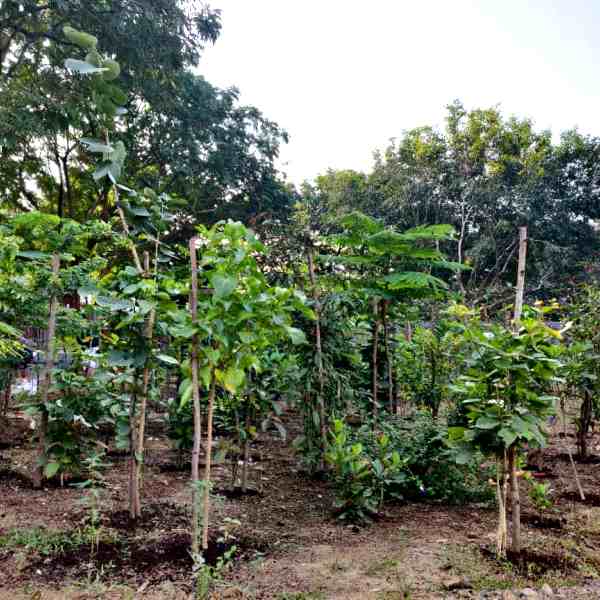
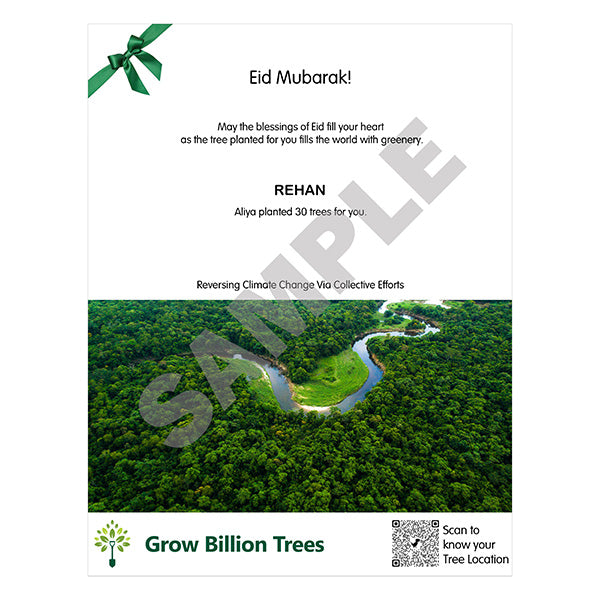
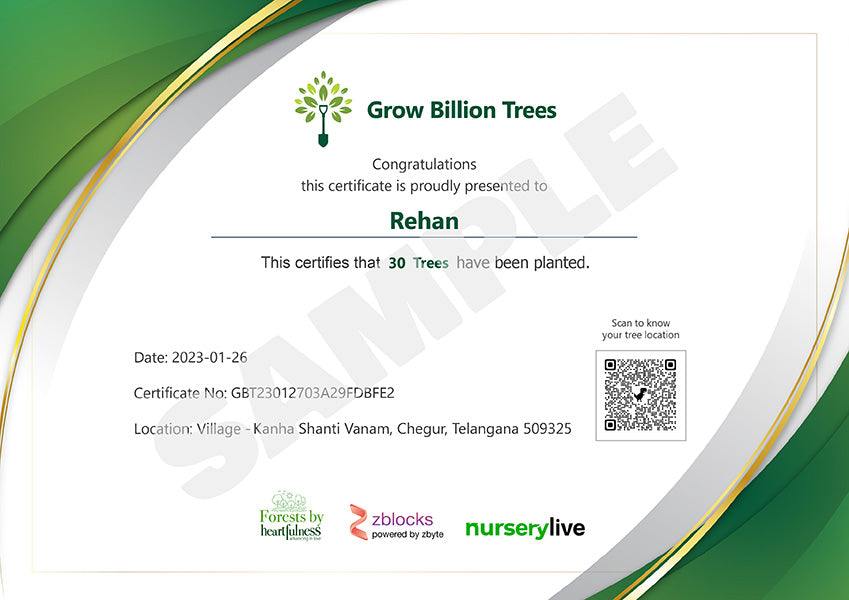
Planting trees on Eid reflects Islamic values of environmental stewardship, compassion, and unity. It helps combat climate change, promo Read more
Trending
Trees for Corporates
Eid Tree Plantation: Celebrate with a Sustainable Gift
Description:
Planting trees on Eid reflects Islamic values of environmental stewardship, compassion, and unity.
It helps combat climate change, promotes clean air, and preserves biodiversity while fostering a sense of community and leaving a positive legacy for the future.
Scope:
- Enhancement of Biodiversity
- Increase in Green Cover
- Generation of Rural Employment
- Improvement of Wildlife Habitats
Tree Species:
The species of trees that are planted depend on the project, and they are chosen based on their native habitat in the corresponding ecological zone.
Why trees?
Planting trees on Eid holds several reasons and meanings associated with it:
- Environmental Stewardship: Islam emphasizes the importance of environmental stewardship and the protection of nature. Planting trees on Eid is a way to fulfill this duty and demonstrate care for the Earth and its resources. It aligns with the Islamic teachings of being responsible guardians of the environment.
- Charity and Good Deeds: Eid is a time of charity and acts of kindness. Planting trees is considered a virtuous act (sadaqah) in Islam. It is believed to earn rewards and blessings from Allah. By planting trees, we can engage in good deeds and fulfill their charitable obligations during the festive season.
- The Symbolism of Growth and Blessings: Trees symbolize growth, abundance, and blessings. Planting trees on Eid signifies the hope for a prosperous future and the desire for acceptance and prosperity to come. It is a way to seek Allah's blessings and thank Him for the bounties of nature.
- Sustainable Living: Planting trees promotes sustainable living and responsible resource management. Trees contribute to environmental sustainability by providing oxygen, absorbing carbon dioxide, preventing soil erosion, and supporting ecosystems. By planting trees on Eid, we can actively participate in preserving the environment and practicing sustainable living.
- Community Engagement: Planting trees on Eid can bring communities together in a collective effort. It provides an opportunity to engage with neighbors, friends, and family members to contribute to a common cause. This fosters a sense of unity, collaboration, and shared responsibility in working towards a greener and more sustainable community.
In summary, planting trees on Eid aligns with Islamic teachings on environmental stewardship, charity, and sustainable living. It symbolizes growth, blessings, and community engagement.
By planting trees, We can actively contribute to environmental conservation and fulfill their religious and moral obligations during the festive season.
Renewal
Trees symbolize new life and renewal, making them a fitting symbol for the Easter season.
Hope
Planting trees on Easter can be a symbol of hope for the future, as they represent growth and new beginnings.
Resurrection
Trees can be seen as a symbol of the resurrection, as they come back to life each spring after a period of dormancy.
Tradition
Planting trees on Easter has become a tradition in many communities, representing the hope and promise of the season.
Community
Planting trees on Easter can be a community event, bringing people together to celebrate the season and work towards a common goal.
Environment
Trees play an important role in the environment, providing oxygen, absorbing carbon dioxide, and providing habitat for wildlife.
Beauty
Trees are beautiful, adding color and texture to the landscape and making the world a more vibrant place.
Shade
Trees provide shade, making them a welcome addition to parks, playgrounds, and other outdoor spaces.
Sustainability
Planting trees on Easter can be part of a larger effort to promote sustainability and protect the environment.
Education
Planting trees on Easter can be an educational opportunity, helping to teach children and adults about the importance of trees and the environment.
Biodiversity
Trees provide habitat for a wide range of plant and animal species, making them essential for maintaining biodiversity.
Climate Change
Trees play an important role in mitigating the effects of climate change, sequestering carbon dioxide and reducing greenhouse gas emissions.
Health
Trees provide many health benefits, such as reducing air pollution and promoting physical activity, making them important for human health and well-being.
Agriculture
Trees are important for agriculture, providing shade, windbreaks, and soil conservation, as well as food and fiber.
Water Conservation
Trees help to conserve water by reducing soil erosion and improving soil water-holding capacity, making them important for sustainable water management.
Economic Benefits
Trees provide many economic benefits, such as timber, non-timber forest products, and ecotourism, making them an important part of many rural economies.
Habitat Restoration
Planting trees can be a way of restoring habitat for endangered or threatened species, helping to protect biodiversity and prevent species extinctions.
Peace
Trees can be a symbol of peace, representing the interconnectedness of all living things and the need to protect and preserve the environment.
Spirituality
Trees have been associated with spirituality for centuries, with many cultures viewing them as sacred or divine.
Global Partnership
Planting trees on Easter can be part of a global partnership to promote environmental sustainability and combat climate change, bringing people from all over the world together to work towards a common goal.
Most Popular
Impact of your Tree
-
Releases Oxygen
A mature tree produces around 120 kilograms of oxygen per year, which is sufficient for one human per year.
-
Reduces Air Pollution
A tree absorbs harmful gases like CO2, NO2 released by factories and vehicles, which can have serious health problems for us
-
Removes CO2
A Tree removes 22 KGs of CO2 from atmosphere per year, which is equivalent to the CO2 realeased by a human in 10 days.
-
Cooling Effect
A Tree generates cooling effect of around 10 room size ACs by providing shade and through a process of transpiration.
Special Plantations
FAQ
Why do we celebrate Easter?
Easter is a widely celebrated holiday that marks the arrival of spring and new beginnings. It is typically observed on the first Sunday following the first full moon after the spring equinox. For many, Easter is a time of gathering with loved ones, enjoying festive meals and treats, and participating in various traditions such as egg decorating and hunting. While Easter is rooted in Christian beliefs and commemorates the resurrection of Jesus Christ, it has also become a cultural event enjoyed by people of all faiths and backgrounds.
What tree is associated with Easter?
The Easter season is often associated with the Dogwood tree, especially in Christian tradition. Legend has it that the Dogwood tree was used to make the cross upon which Jesus was crucified, and as a result, it was cursed and could never grow large enough to be used for such purposes again. The flowers of the Dogwood tree are said to represent the cross, with the four petals representing the four corners of the cross, and the red markings symbolizing the blood of Christ. While this is a legend and not based in historical fact, the Dogwood tree remains a beloved symbol of Easter and the Christian faith.
What is Easter plant?
the Easter Lily is a popular plant during this time of year, especially in Christian tradition, as it is seen as a symbol of purity, hope, and renewal. Other flowers like daffodils and tulips are also commonly associated with Easter, as they are some of the first blooms of spring and represent new beginnings.
What is the significance of Good Friday?
Good Friday represents a solemn and reflective day of remembrance for the sacrifice that Jesus made for the forgiveness of humanity's sins. It is also a time to reflect on the power of love, compassion, and forgiveness, and to appreciate the ultimate sacrifice that Jesus made for the betterment of all humankind.
"Are there other significant days before Easter?
Yes, there are several significant days that precede Easter in the Christian calendar: Ash Wednesday: This marks the beginning of the Lenten season, a period of 40 days of fasting, prayer, and repentance in preparation for Easter. Palm Sunday: This commemorates Jesus' triumphal entry into Jerusalem, where he was greeted by crowds waving palm branches and hailed as a king. Maundy Thursday: This marks the Last Supper, where Jesus shared a meal with his disciples and washed their feet as a symbol of humility and service. Holy Saturday: This is the day between Good Friday and Easter Sunday, when Christians remember Jesus' body lying in the tomb and reflect on the meaning of his death. All of these days hold significance in the lead-up to Easter, and are observed in various ways by Christians around the world."
Why plant trees on Easter?
Planting trees on Easter can symbolize renewal, hope, and new beginnings, making them a fitting symbol for the Easter season. Trees also play an important role in the environment and can be part of a larger effort to promote sustainability and protect the planet.
What types of trees are best for planting on Easter?
The types of trees that are best for planting on Easter will depend on the climate and growing conditions in your area. In general, native trees that are adapted to the local environment are the best choice, as they are more likely to thrive and provide important habitat for wildlife.
How can planting trees on Easter benefit the environment?
Trees provide many environmental benefits, such as sequestering carbon dioxide, reducing air pollution, conserving water, and providing habitat for wildlife. By planting trees on Easter, individuals and communities can help to protect and preserve the environment for future generations.
Is planting trees on Easter a religious tradition?
While planting trees on Easter is not a religious tradition per se, it can be seen as a way of honoring the Easter season and the themes of renewal and new beginnings that it represents. Many communities and organizations have made tree planting a part of their Easter celebrations as a way of promoting environmental sustainability and community engagement.
What are some tips for planting trees on Easter?
Before planting trees on Easter, it is important to select the right species for your area and to prepare the planting site properly. Be sure to follow planting instructions carefully and to water and care for the trees after planting to ensure their survival and growth. Planting trees with friends and family can also be a fun and meaningful way to celebrate the Easter season and promote environmental sustainability.
Can planting trees on Easter help to mitigate climate change?
Yes, planting trees on Easter can help to mitigate climate change by sequestering carbon dioxide from the atmosphere. Trees absorb carbon dioxide through photosynthesis and store it in their wood, leaves, and roots, making them a natural tool for carbon sequestration.
How many trees can be planted on Easter?
The number of trees that can be planted on Easter will depend on the size of the planting site and the resources available for planting. Community tree planting events can often plant hundreds or even thousands of trees, while individual plantings may be limited to a few trees.
What are some organizations that promote tree planting on Easter?
There are many organizations that promote tree planting on Easter, including local conservation groups, faith-based organizations, and environmental non-profits. Some examples include the Arbor Day Foundation, Trees for the Future, and Plant for the Planet.
What are some benefits of planting trees on private property?
Planting trees on private property can provide many benefits, such as shade, privacy, aesthetic appeal, and increased property value. Trees can also provide important ecosystem services, such as air and water quality improvements.
How long does it take for a newly planted tree to mature?
The length of time it takes for a newly planted tree to mature will depend on the species and growing conditions. Some trees can reach maturity in as little as a few years, while others may take several decades.
How can I ensure the success of my Easter tree planting?
To ensure the success of your Easter tree planting, be sure to choose the right species for your area and soil conditions, plant at the appropriate time of year, water and fertilize the tree as needed, and protect it from pests and disease.
Can planting trees on Easter help to reduce erosion and soil degradation?
Yes, planting trees on Easter can help to reduce erosion and soil degradation by stabilizing slopes and preventing soil erosion. Trees also help to improve soil health by increasing soil organic matter and nutrient content.
How can I get involved in Easter tree planting events in my community?
To get involved in Easter tree planting events in your community, check with local conservation groups, environmental non-profits, or faith-based organizations to see if they are hosting any events. You can also organize your own tree planting event with friends and family.
What are some tips for caring for newly planted trees?
Some tips for caring for newly planted trees include watering regularly, mulching around the base of the tree, pruning as needed, and protecting the tree from pests and disease.
How do trees help to improve air quality?
Trees help to improve air quality by absorbing pollutants such as carbon monoxide, sulfur dioxide, and nitrogen oxides through their leaves and roots. Trees also produce oxygen through photosynthesis, which helps to offset carbon dioxide emissions.
Can planting trees on Easter help to promote community engagement?
Yes, planting trees on Easter can be a fun and meaningful way to promote community engagement and bring people together around a shared goal. Community tree planting events can help to build social connections and create a sense of pride and ownership in the local environment.
What are some common mistakes to avoid when planting trees?
Common mistakes to avoid when planting trees include planting too deep, failing to water regularly, planting in the wrong location, and using the wrong planting techniques. Be sure to follow planting instructions carefully to avoid these and other common mistakes.


